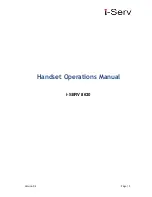
1.16 S
Feature Manual
289
–
"Old" is displayed for voice messages which have previously been listened to.
This information can be viewed with the display of a PT or PS.
Please note that the information shown on the display may vary depending on the information that was
received and the type of telephone used. Only users of a 6-line display PT can view all of the above
information.
Checking Voice Messages Left by Callers
When an extension user accesses his message box, the most recent unplayed voice message is played
first. When one voice message finishes playing, the next most recent voice message will begin playing
automatically. After the last voice message in a message box has finished playing, the voice messages will
begin playing from the most recent voice message again. When all voice messages have been played this
time, the extension user will hear dial tone 4, and the line will be disconnected automatically.
SVM Remote Access from CO Line
An extension user can remotely access his message box through a CO line by calling his own extension
and using the Walking COS feature. This allows the user to, for example, check the voice messages left in
his message box when he is out of the office.
Accessing the Message Box of Another Extension
An extension user can access the message box of another extension by using the Walking COS feature to,
for example, record a greeting message in a message box for an Incoming Call Distribution (ICD) Group as
described below.
In addition, if the user's telephone has a Message button for another extension, the user can easily access
the message box of that extension and listen to the voice messages left by callers.
Message Box for Incoming Call Distribution (ICD) Group
When a call is redirected to an SVM/ESVM card from an ICD Group using Intercept Routing—Overflow (
→
1.9.5 ICD Group Features—Overflow) or Call Forwarding (FWD), the greeting message for the first
extension assigned to that ICD Group will be played, and the voice message from the caller will be recorded
in that extension's message box.
A virtual PS can be assigned as the first extension of the ICD Group. This provides the ICD Group with a
dedicated message box that is not shared with an actual extension. (
→
1.19.2 Virtual PS)
Conditions
[General]
•
Hardware Requirement:
KX-TDA50: An SVM2 card
KX-TDA100/KX-TDA200/KX-TDA600: An OPB card and ESVM4 card
•
The maximum number of voice messages (not including greeting messages) that can be recorded for
an extension can be set between 1 and 100 through system programming. (Default: 10)
•
The Message button or Message/Ringer Lamp will light when an incoming call is answered by the SVM/
ESVM card. However, if a message is not left by the caller, the light will turn off when the call has ended.
•
It is not possible to back up the SVM Log, recorded voice messages or greeting messages. If the PBX
is initialized, all this information is cleared.
•
When the card to which an extension belongs is changed through system programming, all the
recorded voice messages and greeting messages for the extension will be cleared.
Summary of Contents for KX-TDA600 - Hybrid IP PBX Control Unit Max. 1008...
Page 13: ...Feature Manual 13 Section 1 Features and Configurations ...
Page 183: ...1 11 M Feature Manual 183 Operating Manual References 1 3 43 Mute ...
Page 341: ...Feature Manual 341 Section 2 Appendix ...
Page 359: ...Feature Manual 359 Index ...
Page 364: ...Index 364 Feature Manual X XDP EXtra Device Port 95 XDP Digital 193 XDP Wireless 338 ...
Page 365: ...Index Feature Manual 365 ...
















































